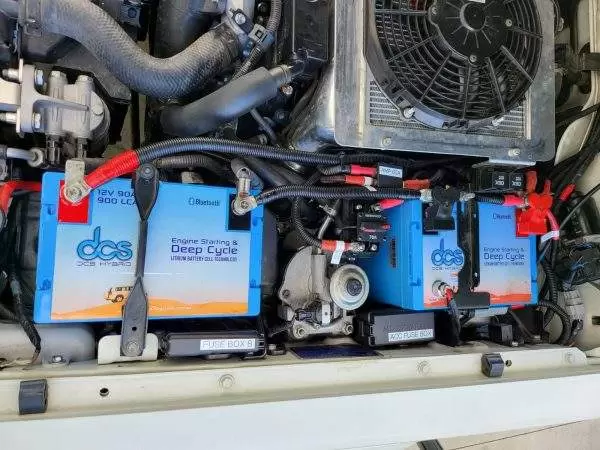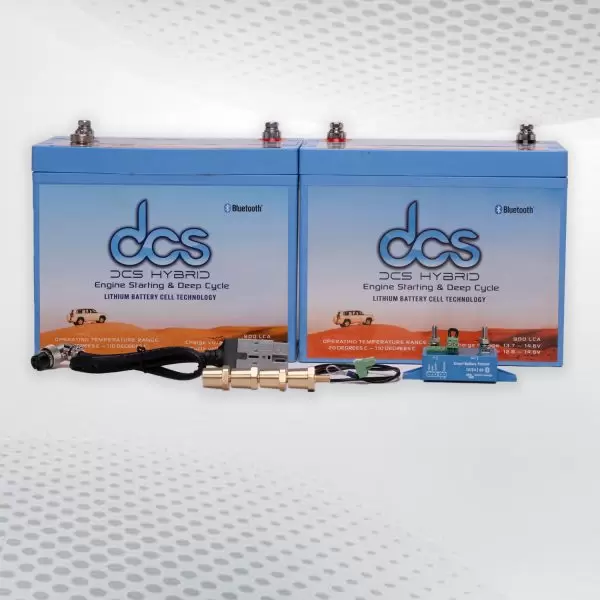In the world of energy storage, there are several types of batteries. Lithium-ion is one of the most popular choices for residential and commercial applications because it’s lightweight, lasts long, and has high capacity. However, lithium-ion batteries also have some drawbacks—they aren’t as efficient at storing energy as lead-acid batteries or other options on the market today. Dual battery systems combine lithium-ion with another type of battery chemistry to solve that issue: deep-cycle lithium-ion batteries. That article will explore how Lithium Ion Dual Battery System work with residential and commercial/industrial applications so you can determine if that technology is right for your home or business!
Lithium-Ion Dual Battery Systems
Dual battery systems are an emerging form of energy storage that combine lithium-ion batteries with traditional lead-acid batteries to create a range of benefits. Because they will be installed as part of an existing grid or on-site, they’re ideal for utilities looking to address peak demand and increase reliability at their facilities. In addition, dual battery systems offer improved performance over traditional single-battery setups by providing more power consistently throughout the day, even when demand is highest.
Why should I invest in one?
Because they allow you access to both types of technology at once without having to choose between them yourself, dual battery systems represent an opportunity for businesses across industries like retailing (whose stores often experience high customer traffic during busy hours), telecommunications (which relies heavily upon uninterrupted internet connectivity) and transportation/logistics (which often require critical data analysis). They also help reduce operating costs by lowering maintenance requirements while increasing longevity through reduced wear on each component due to fewer cycles over time.”
Deep-Cycle Lithium-Ion Batteries
Lithium-ion batteries are used in many different applications. They are light and compact, making them ideal for mobile devices like cell phones and laptops. They can also be used to power electric vehicles (EVs), such as cars and buses–a trend that has gained traction over the past decade thanks to improvements in battery technology, increased demand for EVs due to environmental concerns around fossil fuel use, and higher gas prices.
Lithium-ion batteries have several benefits that make them ideal for energy storage systems:
- They have a long life span.
- They provide high energy density (the energy stored per unit mass).
- They’re safe.
- They don’t require extensive maintenance or special handling because there’s no flammable liquid inside them like other battery types (e.g., lead acid or nickel-cadmium).
What Makes A Dual Battery System?
Dual battery systems are a combination of two batteries in one system. The batteries are connected in parallel, meaning they share the same voltage and will be discharged together. A dual battery system can use the same or different types of lithium-ion cells; however, they should have similar capacities to be charged and discharged at the same rates without any issues.
The main benefit of using a dual battery system is increased energy storage capacity over a single pack configuration and improved safety due to better control over voltage levels during charging or discharging processes (which helps prevent fires).
Dual Battery Systems for Residential Applications
A dual-battery system combines two lithium-ion batteries to provide energy storage at home. The main advantage of a dual battery system over traditional lead-acid batteries is that it allows homeowners to use both batteries simultaneously, which results in increased efficiency and longevity.
When you install a dual battery system, your home will have two separate power sources: one from each of your existing lead-acid batteries and another from your newly added lithium-ion unit(s). Each set of batteries will be used independently or together–and because they’re charged by different sources (the grid vs solar panels), they won’t interfere with each other when you’re using them simultaneously!
Commercial/Industrial Applications for Dual Battery Systems
If you’re a business owner, the future of energy storage is right in front of you. Dual battery systems are an exciting new technology that can help power your business during a blackout or other emergency. But how do you decide whether to install one? And how much does it cost?
First things first: what exactly is a dual battery system? Its two separate batteries installed in tandem at different locations within your facility, near each other.
However, that is not necessarily so; if one fails, backup power will still be available from the other unit. The batteries themselves come with charging units (similar to those used by electric cars), connected via cables running underground or overhead along utility poles outside the building itself (you’ll need permission from whoever owns those lines before attempting any work).
There may also be additional components such as inverters involved depending on what kind of equipment needs charging up after being disconnected from grid sources like solar panels or wind turbines; these devices convert DC into AC electricity so that it can flow through wires easily without losing too much wattage along its journey into homes/offices/etcetera ad infinitum!
Lithium Dual Battery Kit Are the Most Popular Choice
Lithium Dual Battery Kit are the most popular choice for residential energy storage systems. But what makes them so attractive? Lithium-ion technology is one of the most powerful and efficient battery chemistries. It’s also relatively safe, making it an ideal choice for home applications with children or pets. These benefits make lithium-ion batteries more cost-effective than other types of batteries over their lifetime–and they’re easy to install yourself!
A New Era Of Energy Storage Is Coming.
Lithium-ion batteries are currently the most popular choice for residential energy storage systems. They’re safe, reliable, and long-lasting but have limitations.
Lithium-ion batteries can only store so much energy in a given space, which means that if you want to store more power than what’s available in your existing battery system (or if you’re looking to use multiple batteries), it won’t be possible unless you upgrade to a dual battery system. That’s why we believe that technology is the future of residential energy storage: it allows homeowners with solar panels or other renewable electricity sources on their roofs to capture more power from those sources than ever!
Dual Battery Systems Allow You to Store More Energy
Dual battery systems allow you to store more energy than with a single battery system. They also let you store more energy than lead-acid batteries, which will be used with lithium-ion batteries to give you even more capacity. That gives dual battery systems their name: they allow users to effectively double the power they can store to other types of batteries.
Dual battery systems are great for storing a lot of power. They’re also useful if you have a large boat, RV, or other vehicle that needs a lot of power. Dual battery systems will be used with lithium-ion batteries to give you even more capacity.
Tips to Finding the Right Dual Battery System
Finding the right dual-battery system is all about understanding your needs and choosing a system that fits. To help you find the best fit for your needs, we’ve put together some tips on choosing the right system size.
- Determine what type of vehicle you have: The first step in finding the right dual battery system is determining your vehicle type. You can look at the label under your hood or check out our handy guide here! Once you know which type of car or truck (or boat) you have, it’s time to think about what energy storage solution would work best for it.
- Choose between sealed lead acid or lithium-ion batteries: Next up comes choosing between sealed lead acid (SLA) and lithium-ion batteries–both options offer their advantages over each other, so make sure that whichever one makes sense for your application before moving forward with designing anything else!
Advantages of Dual Battery System
With dual battery systems, you can increase the storage capacity and decrease costs.
- Increase Storage Capacity: A dual battery system allows you to use a smaller battery while still getting the same capacity as a larger one would provide. That is because it uses two batteries instead of one large one, which means there will be no wasted space in your system or excessive weight on your vehicle. After all, it only needs extra power storage space. The result is an overall smaller and lighter product with more efficient use of materials–and less money spent on materials!
- Increase Storage Duration: With traditional lithium-ion batteries, there are limits on how long they can hold their charge before needing recharging again; however, with dual-battery systems, these limitations are lifted thanks to having two separate sets within each unit (one set specifically designed for storing energy while another set is dedicated solely towards providing power). In other words, if one set runs out before another does, switch over so both sets last longer than ever!
FAQs
Q: What is the difference between lithium-ion and lead-acid batteries?
A: Lithium-ion batteries are rechargeable, which means they will be plugged in and recharged to use again. Lead acid batteries are not rechargeable; they must be replaced when they run out of power.
Q: What’s the difference between lithium-ion and lithium-polymer batteries?
A: Lithium-ion batteries contain liquid electrolytes stored inside an insulated casing, while lithium polymer batteries have solid electrolytes (they’re more like gel than liquid).
Conclusion
In conclusion, dual battery systems are the future of energy storage. They provide homeowners with more power and flexibility than traditional batteries and will be used for residential and commercial/industrial applications. If you’re looking to install a new system or upgrade your old one, we recommend considering that option before anything else!


